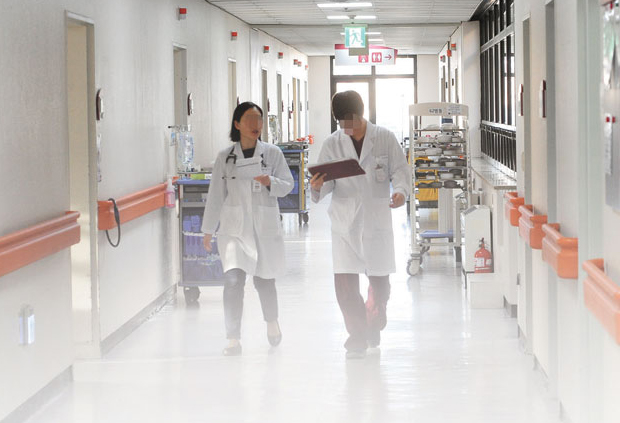Most of the Korean physicians worked six days a week, and more than 300 hours a year than other workers on average in 2016, a survey showed.
Among the doctors, interns and medical residents had the longest working hours, followed by medical professors, clinic-owning doctors, and physicians who receive wages.
The Korean Medical Association’s research institute for healthcare policy unveiled the 2016 Korean Physician Survey, which was on 8,564 physicians from Nov. 21, 2016, to Jan. 8, 2017. It was the first survey on all the physician members across the nation, the institute said.
The survey showed that doctors worked 49.9 hours per week and 2,408 hours a year, on average. According to the Organization for Economic Cooperation and Development, the average working hours in Korea were 2,069 hours a year. In other words, doctors worked about 330 hours longer than average Korean workers.

Only 18.2 percent of the respondents said they worked five days a week. A majority of 66.5 percent said they worked six days a week, and 15.3 percent, seven days a week.
By job category, trainee physicians worked the longest of 66.9 hours a week. Professors came next with 50.9 hours, followed by clinic-owner doctors with 48.8 percent, salary-based physicians with 48 hours, and spokesperson doctors with 41.5 hours.
By department, the surgery had the longest weekly working hours at 50, followed by the internal medicine at 48.2 hours, and general practitioners, 47.9 hours.
Doctors at tertiary general hospitals worked the longest, 56.7 hours a week. Those at general hospitals worked 50.8 hours, clinics, 48.2 hours, university hospitals, 47.9 hours, hospitals, 46.6 hours, nursing homes, 45.8 hours, and healthcare institutions, 40.9 hours.
More than half of interns and residents, or 52.9 percent, said they wanted to be a doctor who receives a salary. Another 15 percent said they wanted to become a professor, and 11.6 percent hoped to open a clinic.
Sixty-one percent of the physicians said they would become a doctor if they were born again but 53.5 percent said they would not recommend their occupation to their children, higher than 46.5 percent who said they would recommend it.
Less than half of the respondents, or 45.7 percent, said they were satisfied with their job title as a professional, and 19.4 percent said they were dissatisfied.
In areas such as relations with colleagues, medical staffs, and patients, doctors had a relatively high level of satisfaction.
However, they were not happy regarding autonomy, workload, legal and administrative regulation of the health authorities. In particular, they marked 1.63 points out of 5 in satisfaction in the government’s legal and administrative regulation.
Doctors had many negative views about the healthcare system in Korea. Almost 59 percent of them said the current medical service system was beneficial, but 21.5 percent said the whole system should be overhauled due to too many problems. About 20 percent said the medical system was well operating and can be improved with some modifications.

